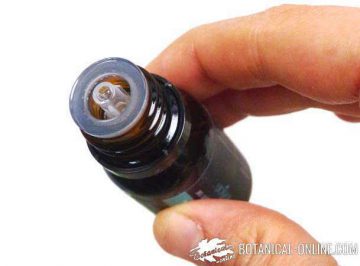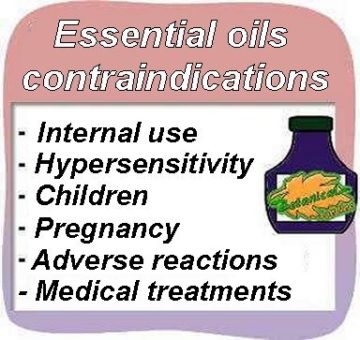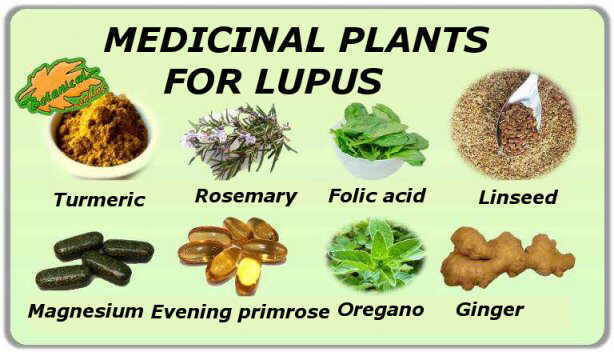Contents
- 1 What contraindications and adverse effects does the internal use of essential oils have?
- 1.1 Problems with the use of essential oils
- 1.2 Dangers in the ingestion of essential oils (internal use)
- 1.3 Consequences of using pure essential oils on the skin
- 1.4 Contraindications of essential oils
- 1.5 Are essential oils contraindicated in respiratory diseases?
- 1.6 Asthma and essential oils
- 1.7 Epilepsy and remedies with essential oils
- 1.8 Essential oils with other medical treatments
- 1.9 Other adverse reactions to essential oils
What contraindications and adverse effects does the internal use of essential oils have?
Essential oils are concentrated fragrances that are extracted from certain parts of certain plants. These preparations are toxic in moderate doses and in high doses they could trigger reactions that could be fatal.
This is because they contain the active ingredients of the plant in very concentrated doses. You need kilos of plants to get a few milliliters of essential oil.
Problems with the use of essential oils

Essential oils are substances of very diverse composition and that are presented in the market in preparations of very different qualities, which can often lead to accidents, either by improper use, or by other factors. The possible dangers can be summarized in the following points:
- Improper use of essential oils, for example applying them undiluted, in excess, or on the mucous membranes can cause adverse reactions.
- Contraindicated use of essential oils, for example during pregnancy or in children
- Variable composition of essential oils: plant growing conditions, harvesting, etc. They make the plant produce different essential oils.
- The effect and toxicity of most essential oil components are unknown.
- Individual sensitivity to essential oil components
- It is unknown if they react with other medications or food components
All this leads to recommend a lot of caution with the use of these medicinal preparations.
Dangers in the ingestion of essential oils (internal use)
In general, the ingestion of essential oils from any plant is not recommended because they are very irritating and potentially toxic. Given the nature of these preparations, there are many different qualities and it is difficult to ensure safe use.
For this reason, essential oils are only recommended for external use remedies (ointments, massage oils, soaps, creams, etc.).
Under professional advice, certain essential oils can be used for internal use, always diluted and in small quantities.
* Related information: Can you ingest essential oils?
Consequences of using pure essential oils on the skin

Essential oils should never be applied directly to the skin, as it may cause skin irritation and adverse reactions.
For proper use, they should be diluted in a vegetable oil (called base oil), which serves as a diluent and transport the medicinal components of essential oils.
Contraindications of essential oils
- Essential oils should not be applied to the eyes (eyelids, dark circles, eyes) or mucous membranes: lips, mouth, nose, ears, nipples, genital or anal areas.
Nor should they be applied to the skin in case of open wounds, damaged skin, bruises, eczema, burns or irritations. - Use of essential oils is contraindicated during pregnancy and lactation: Essential oils are contraindicated in pregnant women and women during breastfeeding. They are potentially abortive and toxic substances if they reach the fetus or the baby, through breastfeeding. During pregnancy, it is recommended that future mothers do not use remedies or cosmetics with essential oils. Among its effects, they can cause abortion (abortifacient), bleeding (emmenagogues) or malformations in the fetus (teratogenic effects). For example, the essential oils of Juniperus sabina and Plectranthus fructiosus produce teratogenic effects.
- Contraindications of oils for children: It is strictly FORBIDDEN to administer remedies with essential oils in infants and children, both internally and externally. Essential oils must be hidden from the sight of children. Ingestion of essential oils can cause serious and even fatal poisoning.
- Hypersensitivity to essential oils: Some people have hypersensitivity or allergy to essential oils. The smell or contact with the skin can cause irritation, dermatitis, burning, redness, asthma or other symptoms. In these cases, exposure to essential oil should be eliminated and the use of creams or cosmetics containing them (hypoallergenic products) should be avoided.
- Plant allergy: Essential oils are contraindicated in case of allergy to the plant from which they come, or to plants of the same family.
Are essential oils contraindicated in respiratory diseases?
There is much controversy regarding the use of essential oils for the treatment of respiratory diseases, such as bronchitis or COPD. While some professionals use them as remedies that help expectorate and eliminate mucus, other professionals warn that cases of asthma crisis have been described by the use of these remedies.
Indeed, the essential oils present in plants have anti-inflammatory and expectorant properties, but the use of pure essential oils can be dangerous, due to the high concentrations of these principles they contain, which can overstimulate the respiratory muscles producing more cough, inflammation and obstruction. of the airways.
Therefore, it seems that the safest way to benefit from the properties of essential oils in these cases is to use preparations with plants as a source of essential oils (infusions, mists, …) and avoid using remedies with pure essential oils.
Asthma and essential oils
The expectorant effects of essential oils can cause asthma attacks in people with hypersensitivity and asthma problems.
Ingestion of preparations with pure essential oils is not recommended if you suffer from these problems. For example, the use of pure eucalyptus essential oil in children with respiratory allergies and asthma is dangerous.
Nor should massage or creams be administered with these components without the supervision of a professional.
Epilepsy and remedies with essential oils
Many essential oils act at the brain level and have neurotoxic effects, especially in moderate doses. Many essential oils have these properties, especially those that are rich in terpenoids, such as anethole (cumin, anise, etc.).
Pure essential oil of rosemary, lavender, chamomile, thyme, juniper and oregano can be neurotoxic.
Due to its narcotic properties, all essential oils are contraindicated in the case of people with epilepsy, whom it can cause seizures and spasms. Sage essential oil is a known epilectigenic.
Essential oils with other medical treatments

Essential oils are also contraindicated in case of taking medications. The combination of drugs with certain essential oils has not been studied. Analyzes indicate that this combination can be dangerous.
For example, the coumarins of some essential oils may potentiate anticoagulant medications and increase the risk of bleeding.
In case of taking medication, it is recommended to consult a doctor before applying any treatment with essential oils.
Other adverse reactions to essential oils
Essential oils can act in many systems of the body, both at the brain, digestive, hepatic or respiratory levels. For this to take place, it is not necessary their ingestion, although it certainly multiplies the risk. The direct exposure of the mucosa with these principles can be enough. The use of ointments or creams that contain them can produce toxicity.
Some sensitive people may have adverse reactions such as: belly pain, cramps, seizures, changes in breathing or heartbeat, headache or migraine, etc.
Phototoxicity reactions can also occur: some essential oils produce skin rashes when the sun’s rays radiate.
In case of experiencing these symptoms it is recommended to stop using the product and consult a doctor.
* Related information: Essential oils toxicity
![]() More information on essential oils
More information on essential oils








